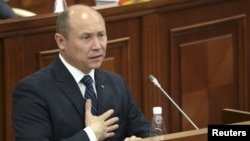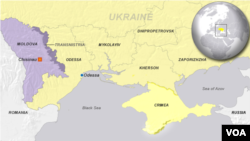Moldova's parliament must form a new government after it backed a motion of no-confidence in the ruling pro-European coalition on Thursday, increasing political turmoil following the fraudulent disappearance of $1 billion from the banking system.
The vote signaled an end to the short-lived government of Prime Minister Valeriu Strelet, who was appointed less than three months ago after Chiril Gaburici resigned amid a scandal over forged high school certificates.
The no-confidence motion received 65 votes in favor — well over the 51 required to pass — after the pro-Russian communist and socialist opposition won support from the Democratic Party, which defected from the three-party coalition.
The motion was brought in connection with corruption linked to the fraud in which $1 billion — roughly one-eighth of the country's gross domestic product — leaked out of the banking system over a number of years.
The prospect of yet another new government added to turmoil in the small and poor ex-Soviet republic of 3.5 million people, which has struggled with endemic corruption and economic mismanagement since the breakup of the Soviet Union in 1991.
Sandwiched between Ukraine and EU member Romania, Moldova embarked on a pro-Europe course in 2009 despite its reliance on Russian energy supplies and the presence of a pro-Russian, self-proclaimed statelet called Transnistria within its borders.
But the disappearance of the $1 billion, which emerged earlier this year, has weakened the national leu currency, hurt the standard of living and shaken confidence in the country's pro-Europe leaders.
Thousands of Moldovans have camped out in central Chisinau since early September, protesting against government corruption and demanding that those in power be held accountable for the fraud.
Explaining his party's decision to vote against its own coalition, Democratic Party leader Marian Lupu, said: "This is a vote of no confidence in Prime Minister Valeriu Strelet, not against his government ... [or] his politics."
His party was "open to discussions about forming a new coalition. This is a new and serious test to all of us, who must continue Moldova's European course of development." The current government will be dismissed only when a new one is formed.
Strelet was appointed premier in July. The coalition, which also includes the Liberal Democrats and the Liberals, holds only a slender majority in the 101-seat assembly.
He has rejected calls to quit. But the banking scandal has tarnished the image of the ruling elite in the eyes of ordinary Moldovans, many of whom struggle by on a baseline family income of around $300 a month.
The most prominent casualty so far of the banking scandal is former Prime Minister Vlad Filat, who was stripped of his parliamentary immunity on Oct. 15 and detained for questioning over the affair. He denies any wrongdoing.
Insiders say the $1 billion fraud, a steady hemorraghing of money in unsupported loans that had been going on for years, reflects deep-seated corruption in Moldova and involved some degree of complicity from many of those in power.
According to Moldovan legislation, the president will suggest a new candidate for prime minister after consulting with all parliamentary factions. If the candidate is approved by parliament, he or she will have 45 days to form a new government and gain approval from parliament.






